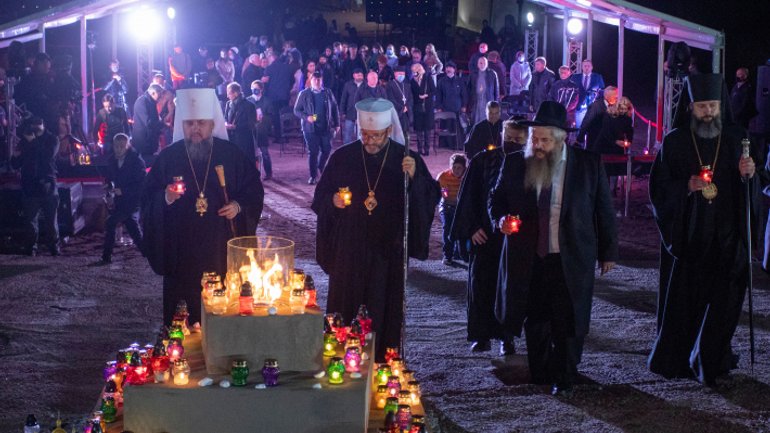Interreligious prayer held in Kyiv near the monument to Babyn Yar victims (updated)

Today in Babyn Yar the lamps and stones are brought to the memorable sites to honor the memory of those who were shot. This symbolic commemoration is also possible online on the site https://babynyar.memorial.
At 20:30 an interreligious prayer began near the monument to Kyiv residents and prisoners of war who were killed in Babyn Yar. It was headed by Metropolitan Epifaniy of Kyiv and all Ukraine of the OCU, head of the Ukrainian Greek Catholic Church His Beatitude Sviatoslav, chief rabbi of Ukraine and Kyiv Moshe Reuven Asman, Chief Rabbi of Kyiv and Ukraine of the communities of progressive Judaism Oleksandr Dukhovny. Bishop Spiridon of the UOC-MP read out words of condolences on behalf of Metropolitan Onufriy.
Rabbi Moshe Reuven Asman began the prayer and speech: "hundreds of thousands of innocent people were shot in Babyn Yar. Babyn Yar is not the only such place. Later, hundreds of similar sites appeared. Today we pray for the innocent lieing here and for the righteous who saved the Jews at the risk of their lives and their families. Metropolitan Sheptytsky also risked his life to save Jewish children. There were many such people. We must do everything possible to ensure that this tragedy never happens again. Children should be told about this at school. This should be our sacred duty." He thanked all faiths for their common prayer.
Five family members of Rabbi Oleksandr Dukhovny were shot in Babyn Yar.
"Bronya never gave birth to her first child at 8 months of pregnancy. My mother and her little sister were taken to be shot. They managed to escape. They were saved by the Ukrainian family Volynets, which is honored as the Righteous Among the Nations. They gave me life, too. We are here not only to remember but also to honor life so that our land is a land of joy and unity. And the best monument for all those who died here is a free, united, merciful and just Ukraine," he said.
The head of the UGCC, Patriarch Sviatoslav, urged to listen to the voice that "cries out from Babyn Yar to the sky."
"This is the voice of our brothers. Before we are Christians, Jews, Muslims, Ukrainians, Jews, Russians, we are human beings. In another person, we are called by our Creator to see our brother. Let's also listen to our hearts, Ukraine and the world. On behalf of the UGCC and as chairman of the AUCCRO, I extend my prayerful solidarity to the Jewish people, our brothers, and the Jewish communities of Ukraine... Let's say to Ukraine and the world: "Never again," the head of the UGCC said.
After the prayer, lamps and stones were laid in memory of the victims of Babyn Yar.
Commemorative events are organized by the Ukrainian Institute of national memory, the Babyn Yar National Historical and Memorial Reserve, and the Institute of History of Ukraine of the National Academy of Sciences with the support of the World Congress of Ukrainians.
Babyn Yar is a place of memory that became known all over the world as a symbol of Nazi crimes against the civilian population during World War II, a symbol of the Holocaust.
On September 29-30, 1941, the Nazis killed almost 34 thousand Kyivans here just because they were Jews. It was one of the largest mass killings of civilians committed by the Nazis during World War II.
During the war, not only Jews were killed and buried in Babyn Yar. During the two years of German occupation, entire groups of people or individuals who were also considered enemies of the Nazis were shot and buried here. In particular, for racial and political reasons, the Nazis also killed Roma, captured Red Army soldiers, psychiatric hospital patients, civilian hostages, Ukrainian nationalists and Soviet partisans, and prisoners of the Syretsky concentration camp. Starting in August 1943, shackled prisoners of the Syretsky camp dug up and burned the bodies of those shot in Babyn Yar.
The total number of victims is estimated at about 100 thousand people, the vast majority of whom were Jews.









